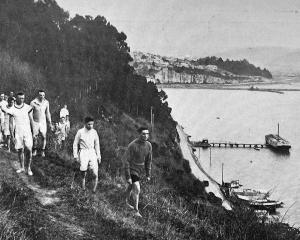Yesterday a Daily Times reporter asked a leading Dunedin doctor to express an opinion whether venereal diseases were more prevalent in Dunedin than usual.
The information obtained from the doctor was of a rather startling nature. He said he was distinctly of the opinion that there was an increase in such diseases, no doubt due to contagion contracted from some of the returned soldiers, and also from soldiers who had contracted the disease while in the camps in New Zealand.
He added that he was certain that the medical authorities attached to the Military Department had in some instances not been sufficiently strict in their examination of soldiers who were arriving by transports, and that, as a result, soldiers suffering from disease had been allowed their freedom.
He instances one case which had come under his own notice. A returned soldier had been primarily responsible for the contamination of five people. He also mentioned another case, where a cook in a local hotel was suffering from syphilis, and continued to follow his occupation.
The doctor remarked that the medical profession had absolutely no control over women who were suffering from contagious disease, and, as a result, they could spread the contagion far and wide.
He was firmly of the opinion that some steps should be taken by the Government to introduce a measure whereby men and women suffering from a contagious disease should be prevented from being a menace to society.
He personally favoured a measure on the lines of the old Contagious Diseases Act. Touching on the matter of the medical examination of returned soldiers, it is said that one transport which brought back returned soldiers had no fewer than 38 cases of venereal disease on board.
Eight of the soldiers reported themselves as suffering from disease, and were placed in quarantine.
The other 30, however, did not report themselves, and, although it is not denied that they might have recovered from the disease while on the voyage out, there was, we understand, no particular examination in their cases - they had not previously reported themselves - and they had slipped off the steamer with the rest of the men who had not contracted any disease.
It seems apparent from the inquiries made by our reporter that certain people strongly object to any such measure as the Contagious Diseases Act. They prefer to hide their heads in the sand, as the ostriches do, and to delude themselves with the thought that a secret disease which is a distinct menace to society does not exist.
•It was announced last evening at the Empire Day celebrations held by the Overseas Club, that the Union Steam Ship Company had decided to purchase an aeroplane, which the company desired to offer to the New Zealand Government for such use in the war as the Government might deem advisable.
Mr Massey has accepted the offer on behalf of the Imperial authorities. It is understood that the value of the machine will be about 2500.
•Pukekohe is in the limelight as a result of a public horsewhipping, the chief actors being a well-known resident and a married soldier on leave. The facts of the case, as understood by the Auckland Star, are likely to be ventilated in the Police Court.
It is stated that when the soldier arrived home from camp on leave his wife complained that she had been annoyed by a certain person. This incensed the man in khaki, and he took the first opportunity of administering to the individual concerned a vigorous horsewhipping.
- ODT, 25.5.1916
COPIES OF PICTURE AVAILABLE FROM ODT FRONT OFFICE, LOWER STUART ST, OR WWW.OTAGOIMAGES.CO.NZ











